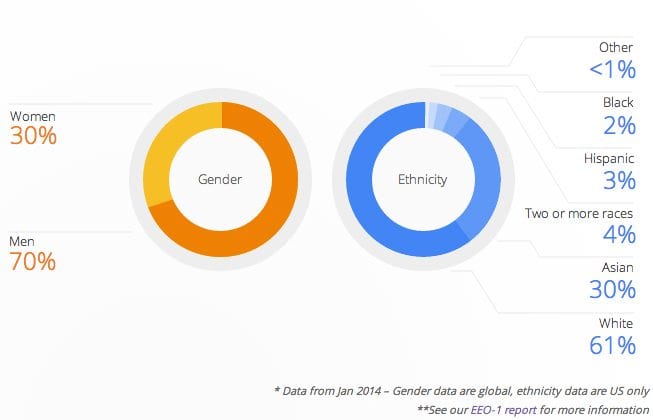
Tech giant Google surprised many last week by going public with data that showed the Silicon Valley-based company has a long way to go in its diversity efforts. Google officials said 70 percent of the company’s approximately 50,000 employees worldwide are men. In the United States, 61 percent of its employees are white, 30 percent are Asian, 3 percent are Latino and 2 percent are black.
“We’ve always been reluctant to publish numbers about the diversity of our workforce at Google. We now realize we were wrong, and that it’s time to be candid about the issues. Put simply, Google is not where we want to be when it comes to diversity, and it’s hard to address these kinds of challenges if you’re not prepared to discuss them openly, and with the facts,” Laszlo Block, Google’s senior vice president of people operations, wrote in a blog that announced the diversity statistics.
Google was quick to point to the low numbers of female, Latino and black college students majoring in computer science and other science, technology, engineering and math fields.
“There are lots of reasons why technology companies like Google struggle to recruit and retain women and minorities. For example, women earn roughly 18 percent of all computer science degrees in the United States. Blacks and Hispanics each make up under 10 percent of U.S. college grads and each collect fewer than 10 percent of degrees in CS majors. So we’ve invested a lot of time and energy in education,” Block wrote.
Block pointed out that Google has given more than $40 million to organizations working to bring computer science education to women and girls since 2010. The company has also been working with historically black colleges and universities to elevate coursework and attendance in computer science. This year Google engineer Charles Pratt was in-residence at Howard University, where he revamped the school’s “Intro to Computer Science” curriculum.
“We’re the first to admit that Google is miles from where we want to be — and that being totally clear about the extent of the problem is a really important part of the solution,” Block concluded.
While many of the U.S.’s biggest companies face scrutiny over diversity in their workforces, few with low numbers have gone public to admit the need for improvement.
Google’s decision to do so has drawn much support.
The Washington-based Latino Coalition, one of the largest membership and advocacy organizations for Latino-owned small businesses, was quick to speak up.
“Diversity management helps companies increase their competitive edge, and Google’s report clearly reveals challenges in respect to women and minorities,” said Hector Barreto, Latino Coalition chairman. “However, we commend Google for their acknowledgement and their decision to be frank about its numbers and rectify these disparities. The Latino Coalition pledges to continue working to improve opportunities for all emerging markets and to be a strong resource in aiding Google to recruit and retain a diverse workforce. The landscape of this great nation is varied and Google’s admission and transparency is the first step in recognizing a problem and striving to make its company reflective of its consumers and key stakeholders.”
“We commend Google’s bold step to be pro-active — a characteristic that still many companies have not embraced. As a key partner, the Latino Coalition will work with Google to attract a global and multicultural workforce that will help cultivate and sustain a varied and highly engaged workforce,” added Allen Gutierrez, the coalition’s national executive director.






